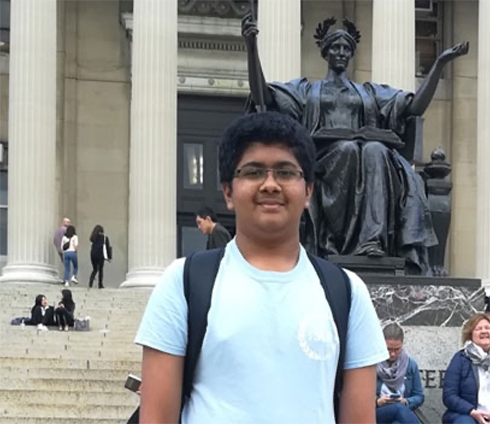 It feels like a lifetime ago that I received the email – 2 weeks earlier than anticipated – indicating that I had been accepted to Columbia University’s undergraduate arts and science institution, Columbia College. I distinctly remember feeling elated when I was further informed that I would be designated as a Science Research Fellow with an associated research grant. The next five months were filled with anxious anticipation as I realized what a Columbia education and the Science Research Fellowship meant for me: an opportunity to pursue my passion for physics and mathematics, and to fulfil my long-standing aspiration to perform influential research at the undergraduate level with experts in the field.
It feels like a lifetime ago that I received the email – 2 weeks earlier than anticipated – indicating that I had been accepted to Columbia University’s undergraduate arts and science institution, Columbia College. I distinctly remember feeling elated when I was further informed that I would be designated as a Science Research Fellow with an associated research grant. The next five months were filled with anxious anticipation as I realized what a Columbia education and the Science Research Fellowship meant for me: an opportunity to pursue my passion for physics and mathematics, and to fulfil my long-standing aspiration to perform influential research at the undergraduate level with experts in the field.
Before I knew it, I was exploring New York City’s famous landmarks, getting acquainted with Columbia’s beautiful – and sprawling, by New York City standards – campus, forming my first group of friends, and peeking into the Columbia ‘bubble’ from an international student’s perspective at the International Student (‘pre-‘) Orientation Program (ISOP). ISOP and the New Student Orientation Program (NSOP) introduced me to the wealth of opportunities at Columbia and advised me on utilizing these. The orientation programs also gave me an insight to the exceptional diversity at Columbia – with multifarious skills, passions, cultures and opinions!
As soon as the orientation came to an end, things started getting hectic. We were encouraged to pursue our interests in various campus clubs and organizations. I enthusiastically auditioned for a few highly selective debate and music clubs and signed on to a few campus science organizations – Columbia Space Initiative, Columbia’s Physics Society, and Columbia’s Undergraduate Science Journal, cautiously avoiding overburdening. With highly demanding physics and math courses, a quickly intensifying Core Curriculum course (Core Curriculum is Columbia’s trademark general-education coursework, in which students learn about the foundations of Western literature, art, philosophy, and music), it was initially challenging to find time to exit the Columbia ‘bubble’ and explore NYC.
However, over the course of my first semester, I got accustomed to the heavy workload, as some of my classes encouraged collaboration with friends/peers, and most of my classes were equipped with an excellent support framework. It also really helped to have my highly supportive family – who, despite being 13,000 kms away in Chennai, were just a phone call away. Then, I reached out to professors whose research I was interested in, and they were very welcoming to discuss projects. Towards the end of my first semester, I started working with a Columbia professor on an extremely interesting astrophysics project which would go on till the beginning of summer 2020.
From working with my peers at the Columbia Space Initiative to drafting an extensive proposal for the first manned mission to Mars, plodding away late at night on crazy problem sets and reviewing journal submissions to watching Broadway shows, meeting physics Nobel laureates, touring the United Nations building, walking through Koreatown and Central Park at night and celebrating Columbia’s annual Tree Lighting Festival – these are but a few of my wonderful experiences at Columbia which I will forever treasure. Just like millions of other university students around the world, my education at Columbia was severely disrupted by COVID-19, due to which I had to return to India and cancel my summer plans. However, I have been fortunate enough to proceed with my education online. While COVID-19 meddled with my second semester experience, I am still just as excited to learn as I was before. At Columbia (online or in-person), I have thoroughly enjoyed my learning in all spheres – coursework, research and non-academic pursuits. This, more than anything, has given me immense motivation to strive to become a physicist.
This is an unedited article. The views, thoughts, and opinions expressed in the article belong solely to the author and should not be attributed to USIEF or to the author’s employer, or any organization, committee, and individual. USIEF is not responsible for any information and fact/figures therein.
